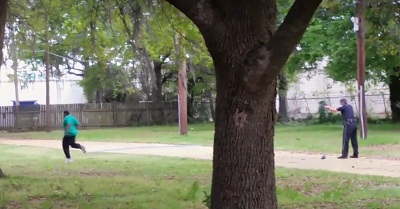What's The Difference Between Murder And Police Work?By Jeffrey TuckerApr. 09, 2015 |
Popular 
Report: Blinken Sitting On Staff Recommendations to Sanction Israeli Military Units Linked to Killings or Rapes

America Last: House Bill Provides $26B for Israel, $61B for Ukraine and Zero to Secure U.S. Border

Bari Weiss' Free Speech Martyr Uri Berliner Wants FBI and Police to Spy on Pro-Palestine Activists

'Woke' Google Fires 28 Employees Who Protested Gaza Genocide

John Hagee Cheers Israel-Iran Battle as 'Gog and Magog War,' Will Lobby Congress Not to Deescalate
 What is the difference between murder and normal police work? Many people who have seen the video from North Charleston, South Carolina, are just sure it constitutes murder. In a moral sense, and this is probably the sense we should draw upon, it does seem like outright murder. One man in public park is slowly running away and another man draws a gun and shoots him in the back eight times. Cold blooded.  The person doing the shooting has the legal right to kill people who resist his orders, because he is a cop, an agent of the state. That's the very essence of the state, its very definition. It can do to us what we are not allowed to do to each other. It is the privileged class. It exercises power of us. It can murder, but we just don't call it that. We call it law enforcement. It's ominous to realize that we only know about this thanks to the smartphone video taken by a passerby. Had he not been there, this would have been just another statistic, perhaps making the local news but that's about it. The cops would have told the usual story about how the dead man was a lethal threat and the case would have been forgotten. What's strange about this case is that the video is so compelling, and so evidently evil, that the local government immediately drew on normal morality (the stuff we use to judge human action generally) and charged the cop with murder. Most observers predict that nothing will happen, and that the cop will be declared innocent, as is usually the case. Under the regulations, cops can kill if they sense a threat. All the police have to do is demonstrate that the victim was up to no good. Do these regulations really bind the state? I'm almost certain that if I ran away from a cop who was trying to ticket me, I would get shot. As I think about it, I could right now get a cop to shoot me within, say, half an hour. I could wander out in the street, block traffic and do crazy stuff, run when confronted by the police, evade for a bit, struggle if caught, and eventually, I could accomplish my own death at the hands of police. Would it be murder? Absolutely. But it is also legally protected murder. We are supposed to suspend normal moral considerations when evaluating the state. We are supposed to obey. We are not allowed to flee. We are supposed to overcome every core biological urge we have in us — no human being wants to be captured — and submit entirely to the rule of our bodies by another person. In the case of the film, that is all that is happening. He was stopped for having a broken tail light. But once the cop had him in his sights, the matter intensified. Then the action began and the victim became afraid. He was behind on the child support. He knew that if he were caught, he would go to jail. He didn't want to go to jail. So he ran, and was shot fully eight times in the back. What happens next is especially chilling. The cop demands that the dead man put his hands behind his back. When he doesn't, the cop does it for him. Creepy doesn't quite describe it. Why do we put up with this? Hard question to answer. But the fundamental answer is the one that no one wants to hear: it's because we allow such a thing as a state to exist at all. By its structure and nature, it has the power of life and death, regardless of time or place, based entirely on its enforcement of the law and regulations. Every regulation and legislation carries the death penalty based on the level of resistance you offer. A good example is the case of a broken tail light. That shouldn't carry a death penalty, right? But, in the end, it does because, if you resist the demand that you comply with every order, you are risking your life. They are the ones with the guns and the statutes that allow using them with impunity. It's also true with child support. Failure to pay is not a tort but rather a crime. The government can put you in jail — some estimates are that 50,000 people are in jail today for this very reason. The only difference between the shocking South Carolina video and the normal conduct of public policy is that the violence of the latter is largely sanitized, its ugly moral core shielded from view by the claims of collective need, science, and democratic consensus. I'm all for prosecuting abuse by the police. I'm for oversight and more regulations on police overreach. But, in the end, if what you see in this video bothers you, you have to rethink the whole institution of the state itself. The only thing that will end police killings of people whose only crime is resistance is the elimination of the state itself and that very strange power that it possesses to do to us what we are not permitted to do to each other. The state, like this video, doesn't make moral sense. |



